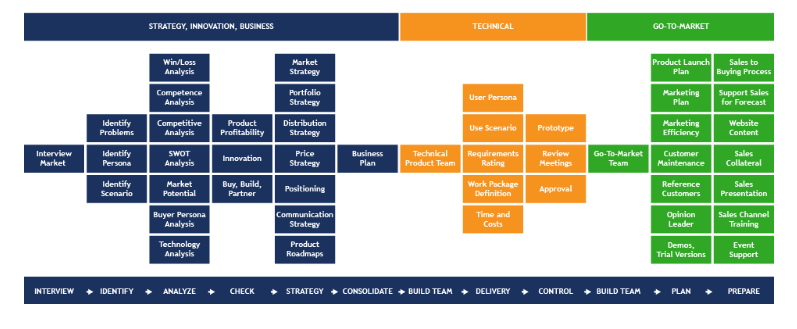Again and again we companies are asked: What can personnel development in product management look like? How to define goals for product managers?
Before we give concrete tips and practice-oriented points for personnel development in product management here, we need a brief explanation of the tasks of product managers and their widespread way of working. Only if we have a consistent picture here can you later independently define clear goals for product managers.
Today we often hear that a product manager has to cover the three different areas of product management alone. The easiest way to recognize the three areas is with the help of our Open Product Management Workflow™.
Clearly identifiable are the areas:
- Strategy (Innovation, Bussines)
- Technic
- Go-to-Market
If all three areas are to be handled by one product manager, then practical experience shows that the parts of Strategic Product Management and Successful Go-to-Market are always neglected. This is often the result of an unclear understanding of the tasks of product management in the company, but also stems from the task load in the area of technical product management.
Open Product Management Workflow™
- Course: Strategic Product Management
- Course: Technical Product Management
- Course: Successful Go-to-Market

Tipp:
You can find detailed information on the tasks in our article "Product management tasks". For an optimal division into the three areas, we recommend that you read our book Strategic Product Management, which is available free of charge.
If we look at all three areas and their associated tasks, it is easy to see that you can define your own goals for product managers in each area. This means that the division of tasks also has a strong influence on personnel development in product management.
Defining goals for product managers - hard facts and soft factors
When it comes to goals that can be used to evaluate product managers, there are real and robust facts as well as soft factors.
Soft factors
The soft factors are particularly important because they have a very high influence on product success as well as on the measurable hard facts. Therefore, in the interest of one's own company, increased attention should be paid to these factors during personnel development in product management.
One of these soft factors is, for example, social competence.
A product manager must have very high social skills, because in his daily work he has to deal with all departments of the company as well as with customers. For this reason, this point should always be at the top of the evaluation or definition of goals for product managers.
Here, for example, the reputation within one's own department but also the reputation or satisfaction of colleagues from other departments can be used.
In addition to social competence, professional development is also a criterion that should be reviewed.
. Here, one can evaluate one's own commitment to continuing education. Does the colleague educate himself/herself by using articles and technical literature for self-study or does he/she attend events such as trainings or technical conferences?
Hard facts
With the hard facts, measuring personnel development for product management is easier. However, as previously described, the areas of the tasks should be clear.
Since product success is the primary concern for the company, criteria should be used that have a direct impact on success.
. Define goals for product managers can be based on hard facts as follows.
Measurable goals in the areas of strategy and go-to-market:
- Number of interviews conducted, especially with potential customers
- Actively managing product success with the help of KPIs and initiating and implementing the appropriate measures
- Implementation of the milestones into roadmaps
- The deviation between the planned and actual state for the forecast planned by the product manager
- Marketing efficiency
- Implementation of strategies from strategic product management in the Go-to-Market area
Measurable goals in the area of technology:
- Frequency of changing the priority of requirements (none = very good; very much = unsatisfactory)
- Keeping the costs for product development
- The deviation between the planned and actual state for the schedule planned by the product manager
- How many problems that were planned in the roadmap are solved by the product?
- Product quality = number of support requests (few = very good; very many = unsatisfactory)
To help you accurately measure the targets in the different areas, we offer the tools for product managers that we provide in our free Product Management books anführen und die als Product Management software sowie in den Product Management trainings erhältlich sind.
Further information, help, tools
If you want to specifically address and implement the topics of personnel development in product management and defining goals for product managers, we recommend the following for further reading:
About the author
Frank Lemser is a trainer and founder of proProduktmanagement.
He has been a market-driven evangelist since the beginning of the 2000s and since then has also been methodically involved with product management. He has developed the Open Product Management Workflow™, numerous tools for product managers, written and published books free of charge and was involved in the development of the Product Management Dashboard for JIRA. His personal goal is to solve many everyday and work problems for product managers, to professionalize and simplify the work for product managers.




















